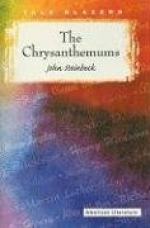|
This section contains 2,928 words (approx. 10 pages at 300 words per page) |

|
SOURCE: “‘The Chrysanthemums’: Study of a Woman's Sexuality,” in Modern Fiction Studies, Vol. XIV, No. 4, Winter, 1968–69, pp. 453-58.
In the following essay, McMahan identifies unfulfilled sexual desire as the source of Elisa Allen's frustration in “The Chrysanthemums.”
Virtually every critic who has considered John Steinbeck's short story “The Chrysanthemums” has agreed that its basic theme is a woman's frustration, but none has yet adequately explained the emotional reasons underlying that frustration. In fact, Kenneth Kempton would consider such an explanation impossible. He professes his inability to find any consistent motivation for Eliza's behavior, and declares the work “annoyingly arty, muddy, and unreal.”1 But most critics who have examined “The Chrysanthemums” admire the story and find it meaningful. Warren French, after identifying the theme of the story as frustration, suggests that the central action concerns “the manipulation of people's dreams for selfish purposes”2—an interesting and valid idea but...
|
This section contains 2,928 words (approx. 10 pages at 300 words per page) |

|


